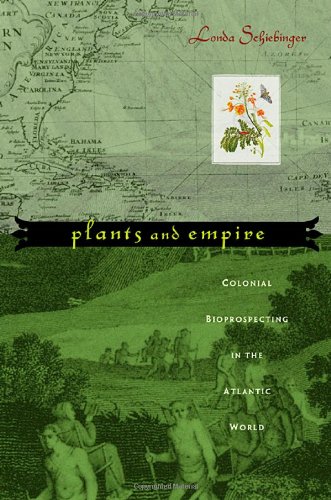Plants and Empire: Colonial Bioprospecting in the Atlantic World - Hardcover

Plants seldom figure in the grand narratives of war, peace, or even everyday life yet they are often at the center of high intrigue. In the eighteenth century, epic scientific voyages were sponsored by European imperial powers to explore the natural riches of the New World, and uncover the botanical secrets of its people. Bioprospectors brought back medicines, luxuries, and staples for their king and country. Risking their lives to discover exotic plants, these daredevil explorers joined with their sponsors to create a global culture of botany.
But some secrets were unearthed only to be lost again. In this moving account of the abuses of indigenous Caribbean people and African slaves, Schiebinger describes how slave women brewed the "peacock flower" into an abortifacient, to ensure that they would bear no children into oppression. Yet, impeded by trade winds of prevailing opinion, knowledge of West Indian abortifacients never flowed into Europe. A rich history of discovery and loss, Plants and Empire explores the movement, triumph, and extinction of knowledge in the course of encounters between Europeans and the Caribbean populations.
"synopsis" may belong to another edition of this title.
Londa Schiebinger's ambitious, eminently readable new book focuses on "the long eighteenth century" when botany reigned as queen of the colonial sciences...Hopefully, Schiebinger's intellectual voyage beyond Europe's borders will lead many others to recognize the fundamental importance of knowledge formation--and non-formation--on the colonial "periphery" of the Atlantic World. (Gregory T. Cushman Journal of the History of Medicine)
This is a curious book. The heart of it tries to explain why something did not happen...[Schiebinger's] focus is, as she puts it, 'the nontransfer of important bodies of knowledge from the New World into Europe.' It is, then, a study in 'agnotology,' that is, of 'culturally induced ignorances.' The study of things that did not happen and of ignorances does not sound promising, but Schiebinger has written an entertaining book that raises some interesting questions, and for people passionate about the history of fertility control, no doubt, an important book. (J.R. McNeill H-Net)
[A] fascinating study...Schiebinger has read widely in the natural-historical and medical literature of the period, and she writes engagingly, bringing to life many of the chief protoganists. This book ought to be essential reading for anyone interested in the relationship between science and empire. (Mark Harrison American Historical Review 2005-06-01)
Plants and Empire presents a subtle and compelling explanation for why knowledge of West Indian abortifacients was not taken up by scientists in Europe. More broadly, Schiebinger illustrates the explanatory power of agnotology. Her study of scientific ignorance demonstrates that understanding what scientists do not know is just as important as understanding what they do know. (Stuart McCook Science 2005-01-01)
"About this title" may belong to another edition of this title.
- PublisherHarvard University Press
- Publication date2004
- ISBN 10 0674014871
- ISBN 13 9780674014879
- BindingHardcover
- Number of pages320
- Rating
Buy New
Learn more about this copy
Shipping:
US$ 3.50
Within U.S.A.
Top Search Results from the AbeBooks Marketplace
Plants and Empire: Colonial Bioprospecting in the Atlantic World
Book Description Hardcover. Condition: new. New. Seller Inventory # Wizard0674014871
Plants and Empire: Colonial Bioprospecting in the Atlantic World
Book Description Hardcover. Condition: new. New Copy. Customer Service Guaranteed. Seller Inventory # think0674014871
Plants and Empire: Colonial Bioprospecting in the Atlantic World
Book Description Hardcover. Condition: new. Brand New Copy. Seller Inventory # BBB_new0674014871

